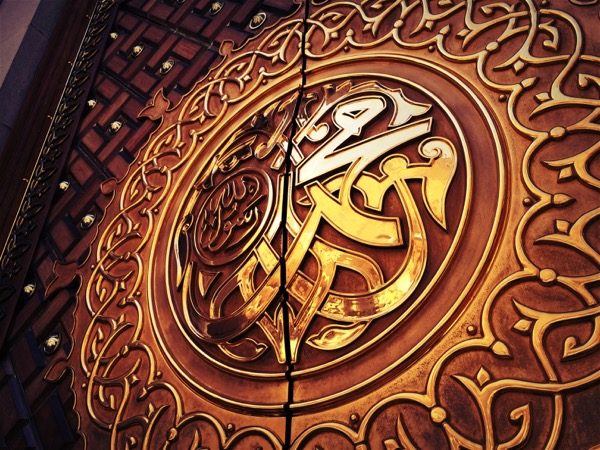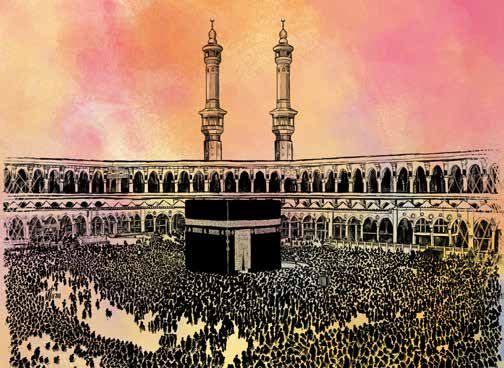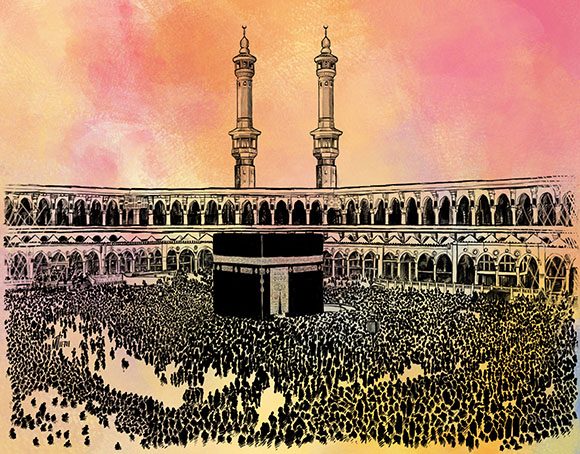
PART II OF II
Translated from the Urdu by Murtaza Ahmad
Hazrat Safiyyahra and the Prophet Muhammad’ssa Boundless Kindness
Hazrat Safiyyahra relates that:
“There was nobody I hated more than the Holy Prophetsa prior to our marriage. However, from our very first meeting, he treated me with such love and compassion and insisted on repeatedly apologising to me. ‘O Safiyyah, your father was he who had incited the whole of Arabia against me and he did this and that. Eventually, he compelled us to come to Khaibar to take retaliatory measures against his conspiracies and to defend ourselves.’”
Hazrat Safiyyahra narrates that the Holy Prophet’ssa propensity for rendering earnest apologies in this regard led her heart to be completely freed of her earlier prejudices against the Prophetsa. She recalls that: “As I stood up after having my first meeting with the Prophetsa, there was nobody more beloved to me than him. He was the most beloved and most dearly loved.”1
Hazrat Safiyyahra relates that upon the occasion of Hajjatul Wada [the farewell Hajj, or Pilgrimage, during the lifetime of the Prophetsa], the Prophetsa desired to return to Madinah quickly. Hazrat ‘A’ishahra relates that she feared that due to Safiyyah’sra ayyaamul-makhsoosah [menstrual periods] perhaps they would have to stop for a few days so that she too could complete the last Tawaaf [to perform a circuit of the Ka’bah], upon which the Holy Prophetsa enquired if they would have to stop because of Safiyyahra. This was the compassion of the Prophetsa that if, after Hajj [the pilgrimage to Makkah], owing to the demands of her being a woman, Safiyyahra needed to complete her Tawaaf, then they would all have to wait for her.
He was then informed that she had performed the Tawaaf-e-Ifaazah.2 The Prophetsa replied, “Good! That means we can set off.”3
In an account of this journey, Hazrat Safiyyahra narrates that upon their return from Hajj, “My camel was very fast. The Holy Prophetsa asked the camel rider to pull the reins of the camel slightly slower since women were part of the caravan.” Suddenly her camel became stuck and stopped. Due to this, she became afraid and started to cry. The Prophetsa attempted to console her, but however much he tried, she cried even more:
“O Messenger of Allah! My camel ought to have been the fastest! It has stopped and sat down.”
After all his attempts to pacify her had failed, the Prophetsa stood up and said: “You have stopped the entire caravan!” Hazrat Safiyyahra relates that:
“At the next resting place, I regretted that I had been so impatient and unable to act with forbearance. In my heart, the thought arose that if the Prophetsa became angry with me, it may be that Allah would also be angry with me. Then I thought of a plan to appease the Prophetsa. I told ‘A’ishah: “Today I will give my turn to you to be with the Holy Prophetsa upon the condition that you make the Prophetsa pleased with me.””
Hazrat Safiyyahra feared that since she had not followed the Prophet’ssa instruction to stop crying immediately, he might be angry with her. Hazrat ‘A’ishahra accepted her condition. She put on a beautiful shawl and perfume and entered the tent of the Prophetsa in her best clothes. As soon as she lifted her veil, the Holy Prophetsa said, “’A’ishah! It is not your turn today. It is Safiyyah’s turn.” Hazrat ‘A’ishahra, with great presence of mind, answered with this part of the verse of the Holy Qur’an:
‘That is Allah’s grace; He bestows it on whom He pleases.’”4
She then narrated the whole incident and told him how Hazrat Safiyyahra had given up her turn with the condition that Hazrat ‘A’ishahra made sure that the Prophetsa was pleased with Hazrat Safiyyahra. The Prophetsa replied, “I am not angry with her, I am happy with Safiyyahra.”5
During this journey, the Prophetsa demonstrated another act of kindness for Hazrat Safiyyahra. Her camel stopped moving and the Prophetsa became concerned about her ride for the remainder of the journey. Hazrat Zainab bint Jahshra had two camels. The Prophetsa urged her to give her other camel to Safiyyahra since Safiyyah’sra camel was not moving. Although Hazrat Zainab bint Jahshra did not render the sacrifice and eventually the Holy Prophetsa became angry with her for a while. However, for Hazrat Safiyyah’sra sake the Prophetsa did not hesitate to seek help from another wife, if it was necessary.6
In one incident, during the month of Ramadan, the Prophetsa was sitting I’tikaaf.7 The noble wives would come to visit the Prophetsa in Masjid Al-Nabawi [the Prophet’ssa Mosque], and having met him returned to their homes. Hazrat Safiyyah bint Huyayyra, whose house was located some distance away from the Mosque (the rooms of some of the other wives were connected to the Mosque) stayed there a little longer one evening. The Prophetsa did not deem it appropriate to send her alone at night. Therefore, he decided to accompany her. When they reached the door of the Mosque the Prophetsa saw two Ansaari8 brothers walking pass. They extended the Islamic greeting of saying Salam (peace) to him and upon observing that a veiled woman was walking with him, they started to walk in haste. The Prophetsa saw them and said, “Wait a minute! My wife Safiyyah bint Huyayy is with me.” The Ansaari brothers stopped in their tracks and felt very anxious and ashamed and inquired, “O Messengersa of Allah, Allah is Holy! How could you even imagine that we would think of anything but that?” The Holy Prophetsa said, “Inside man Satan circulates around with the speed of blood; I feared lest some negative thoughts come in your hearts.”9
The Love for the Divine
Hazrat Safiyyah’sra freed slave Kinanah narrates that Hazrat Safiyyahra said: “Once the Holy Prophetsa came to me. I had four thousand date stones with me. I used to do tasbeeh10 on them. The Prophetsa enquired, ‘What purpose are they for?’ I replied, ‘I enumerate them one by one and offer Allah’s praise and glorify Him.’ The Prophetsa asked, ‘Shall I not tell you a better way than this?’ Then he went on to explain that instead of counting them one by one and offering Allah’s praise through them, you should read:

Allah is as Holy as His creation is plentiful.11
Such were the exquisite methods for the remembrance of God that the Holy Prophetsa taught his wives. In turn, his noble wives, who had the good fortune of being blessed with the Prophet’ssa moral training and companionship, would strive in their individual capacities to elevate their spiritual planes with respect to the remembrance and worship of God.
The Love for the Prophetsa
The degree of affection that Hazrat Safiyyahra had for the Holy Prophetsa can be ascertained from the Holy Prophet’ssa last period of illness. The noble wives of the Holy Prophetsa sat enquiring about the Prophet’ssa health. During this time, Hazrat Safiyyahra uncontrollably exclaimed, “O Prophetsa of Allah, I pray that I get your illness and Allah cures you.” Upon hearing this, some wives winked ironically. The Holy Prophetsa knew that Hazrat Safiyyahra had a clean heart and stated, “By God! She speaks the truth,” i.e., she made this wish for me with a sincere heart.12

This incident is a great testimony to Hazrat Safiyyah’sra high morals and truthfulness. Here was a young woman brought up in a Jewish household with a father, who, on account of his religious enmity, decided to oppose the Holy Prophetsa in order to maintain his leadership and state, despite having learnt the truth of the Holy Prophetsa from Jewish prophecies. He remained ever-ready to oppose the Prophetsa for the rest of his life. In the Battle of the Ditch, he and his people were exiled from Madinah for supporting the opposing Quraish [a Makkan tribe] disbelievers, declaring war against the Prophetsa and breaking their peace treaties. Subsequently, he settled in Khaibar, and established strong stations against Islam. Eventually, in the midst of the battle fields of Khaibar, when he and his people’s fate was decided, not only Hazrat Safiyyah’sra father but also her husband along with many others were killed, and she said that for her it was indeed the Prophetsa who was the most hated figure. However, after entering the house of the Prophetsa, her impression of the Holy Prophetsa completely transformed to the extent that she was willing to sacrifice her own life for him. She was so much in love with him that with the sincerity of her heart, and by the virtue of her own account, there was nobody more beloved in her eyes than the Holy Prophetsa. The Prophetsa himself vouched for her by testifying that she indeed had sacrificed herself for him with a sincere heart.
Such impressions and sentiments from the daughter of one of the most sworn enemies of the Holy Prophetsa, who had observed the character of the Holy Prophetsa in close quarters after taking up her station as one of his noble wives, demonstrates the excellence and purity of the Prophet’ssa morals and the truthfulness of his claim. The Holy Prophetsa aptly changed her name from Zainab to Safiyyah, i.e., one who had cleansed her heart for the Holy Prophetsa and Islam and became pure for him.
The Orientalists’ Astonishment at Safiyyah’sra Transformation
With respect to the transformation of Hazrat Safiyyahra, orientalist David Margoliouth writes:
“Some Moslems paid her the compliment of thinking she meant to play Judith’s part, but they did her more than justice. Just as the Jewish tribes had each played for its own hand, careless of the fate of the others, so to this woman a share in the harem of the conqueror made up for the loss of father, husband, brethren, and religion. So Beckwourth found that a few hours were sufficient to reconcile the American squaws to captivity. Dragged from the blood baths in which their husbands, fathers, and brothers perished, they in a little time became cheerful and even merry.
Another Jewess, Zainab, the wife of Sallam, son of Mishkam, who figures as a partisan of Mohammed, tried with partial success a plan which others had attempted—to fail entirely. She found out what joint was the Prophet’s favourite food, and cooked it for him, richly seasoned with poison. The Prophet’s guest, Bishr, son of Al-Bara, took some and swallowed it; and presently died in convulsions…But when three years after he died of fever, he thought it was Zainab’s poison still working within him.”13
If Margoliouth had studied history without prejudice and kept in view Hazrat Safiyyah’sra background and childhood before accepting Islam, he would not have had any other option than to concede that this transformation was not suddenly brought about within her. Had this change occurred in Hazrat Safiyyah’sra life within a night, it would certainly have been a moral miraculous achievement of the Holy Prophetsa. Hazrat Safiyyahra testifies that, “the Holy Prophetsa, who I hated the most in the world, became my most beloved.” In actuality, the truth of Islam had taken root in Hazrat Safiyyah’sra heart in her childhood, the day she heard her father and uncle talk about the truthfulness of the founder of Islam and that although he was indeed the awaited and true Prophetsa, they were going to oppose him.
The other historical watershed moment that transpired during the life of Hazrat Safiyyahra was, as related earlier, at the time of the besiegement of Khaibar when she dreamt that the moon had fallen into her lap. Upon hearing this, her husband slapped her saying ‘Do you wish to marry the king of Arabia?’ In actuality, the Holy Prophetsa was the interpretation of what she saw in her dream. Where this dream demonstrates Hazrat Safiyyah’sra genuineness, her purity of heart and the Divine plan for her, there the quick fulfilment of this dream was sufficient to enable the Prophet Muhammadsa to win her heart over. Moreover, the manifestations of the Prophet Muhammad’ssa benevolence and high morals were such that won over Hazrat Safiyyah’sra heart. The true facts themselves make Margoliouth’s criticisms pale away into insignificance. Had the Jewish disposition been to make peace with the circumstances only for personal gains, then according to the views of Margoliouth and Sir William Muir, there was also the case of Hazrat Safiyyah’sra Jewess namesake [by the name of Zainab] who did not desist from adding poison in the Prophet’ssa food. Juxtaposed with this, the great transformation in Hazrat Safiyyahsa increases ever more. And this is testimony to the truth of this great teacher and trainer, the Holy Prophetsa, and his excellent morals. With reference to the impact of this pure companionship, Hazrat Maulana Hakeem Nur-Ud-Dinra, Khalifatul Masih I, states, “The wife of the Noble Prophetsa, Mariahra, was initially a Christian, and Safiyyahra was a Jewess. In the company of the Holy Prophetsa they became free from these beliefs.”14
Bond with Khilafat
The bond of obedience and love that Hazrat Safiyyahra held for the Khulafa-e-Rashideen [Rightly Guided Successors] can be illustrated through the following incident: During the period of Hazrat Uthman’sra Khilafat [Caliphate], who was the Third Khalifah after the Holy Prophetsa, he was besieged. Hazrat Safiyyahra expressed her desire to support Hazrat Uthmanra and set out to meet him. On the way, the chief of the rebels, Ushtar, stopped her and wanted to attack her camel and dishonour her. She said, “Take my camel back, I do not wish that in this manner provisions are made for my humiliation.” Hazrat Safiyyahra then made another arrangement to support Hazrat Uthmanra. Her house was close to his and she placed a plank of wood between her house and that of Hazrat Uthmanra and kept contact with him by allowing water, food and other amenities to reach him during the besiegement of his home.15
Allah had granted Hazrat Safiyyahra extraordinary forbearance. Once, during the time of Hazrat Umarra, the Second Khalifah after the Holy Prophetsa, her slave complained that she gave preference to the day of the Sabbath over Jumu‘ah, (Friday). She said: “On this day, she treats Jews with more kindness and gives charity, etc.”
Hazrat Umarra,who commanded an extremely just disposition, enquired from Hazrat Safiyyahra what the matter was really about. Hazrat Safiyyahra answered, “While Allah has given me the blessed day of Jumu’ah, how would it be possible that I instead give preference to another day?” I have some Jewish kindred and according to their rights I treat them with forbearance.” This clarification was sufficient for Hazrat Umarra.
Afterwards, Hazrat Safiyyahra asked her slave, “What made you complain?” She replied that it was merely, “the incitement of Satan.” Hazrat Safiyyahra responded by saying: “Go! I free you.”
Such was her compassion and insight that she forgave and treated kindly the slave who had raised a complaint against her.16
Hazrat Safiyyahra also narrated some Hadith [tradition of the Holy Prophetsa] on the authority of the Holy Prophetsa. She relates that:
“The Prophetsa stated that a time would come when some people will attack the shrine of the Ka’bah [Holy House of Allah in Makkah] and they would be destroyed. I asked, ‘O Messenger of Allah! From among those who will attack there may also be those who would abhor such an act.’ The Prophetsa replied, ‘Allah will deal with them according to their intentions.’”17
Demise
Hazrat Safiyyahra passed away during the reign of Hazrat Amir Muawiyyah in the fiftieth year of the Hijrah, in the month of Ramadan. Coincidently, she had also married the Holy Prophetsa during the month of Ramadan. She was buried along with the rest of the wives in Jannatul Baqi.18,19
Endnotes
1. Ali ibn Abu Bakr al-Haythami, Majma’ al-Zawa’id, n.d., 8:406.
2. Tawaaf-e-Ifaazah is the tawaaf performed after offering the Qurbani (sacrifice) and the shaving of the head during the month of Dhul-Hijjah– a ritual done during the month of the Hajj pilgrimage.
3. Azwaaj-un-Nabi, 214.
4. Holy Qur’an, Surah Al-Jumu’ah, Verse 4.
5. Ibn Majah, “Kitabul Nikah Bab Marati Tahaba Yawmaha,” in Sunan Ibn Majah, n.d.; Ahmad ibn Hanbal, Musnad Ahmad Ibn Hanbal, vol. 6, n.d., 337.
6. Ahmad ibn Hanbal, Musnad Ahmad Ibn Hanbal, 6:337.
7. The Prophetic tradition of spending the last ten days of Ramadan in the remembrance of God in the Mosque. He would cut himself off from the rest of the world’s affairs and increase his devotion and worship seeking as many blessings from God in this limited period. The Prophetsa is also recorded to have performed I’tikaaf for a period of twenty days.
8. Ansaari literally meaning “Helpers” refers to those early devout Muslims who lived in Madinah and had vowed to help the Prophetsa and the emigrants with him (Muhajjirin) after 13 years of persecution in their homeland Makkah and gave refuge to them and provided them with much help.
9. Imam Bukhari, “Kitabul I’tikaaf Bab Hal Yadra Almu’takif ’an Nafsi,” in Sahih Bukhari, n.d.
10. Tasbeeh refers to the Prophetic tradition of supplicating and glorifying the name of God in order to seek blessings from God.
11. Muhammad ibn ‘Isa at Tirmidhi, “Kitabul Da’waat Bab Fi Dua-an-Nabi,” in Al-Jami’ As-Sahih, n.d.
12. Ibn Sa’d al-Baghdadi, Tabaqat-al-Kubra, 8:128; Ibn Hajar al-Asqalani, al-Isaba Fi Tamyiz al-Sahaba, vol. 7, n.d., 741.
13. David Margouliouth, Mohammed and the Rise of Islam (New York: The Knickerbocker Press, 1905), 360–362.
14. Haqaaiqul Furqaan, V.3, p.409.
15. Ibn Sa’d al-Baghdadi, Tabaqat-al-Kubra, 8:128; Ibn Hajar al-Asqalani, al-Isaba Fi Tamyiz al-Sahaba, 7:741.
16. Ibn Hajar al-Asqalani, al-Isaba Fi Tamyiz al-Sahaba, 7:741.
17. Ahmad ibn Hanbal, Musnad Ahmad Ibn Hanbal, 6:337.
18. Ibn Sa’d al-Baghdadi, Tabaqat-al-Kubra, 8:128.
19. Tabaqaatul Kubrah v8 pp.128, Ayoun al-Athri V2 pp.308




Add Comment